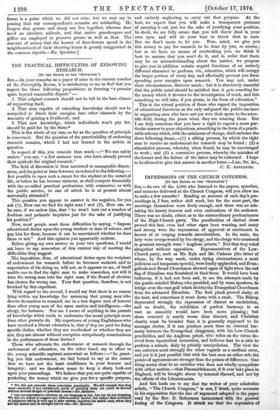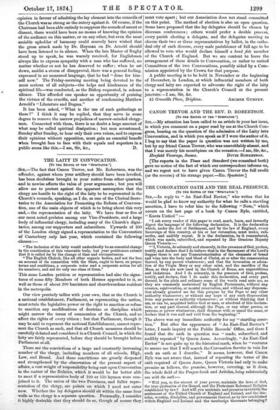IMPRESSIONS OF THE CHURCH CONGRESS.
[To THE EDITOR OF THE "SPECTATOR:1
Sru,---As one of the 4,000 who listened to the papers, speeches, and sermons delivered at the Church Congress, will you allow me to make a few remarks ? Reading an account of each day's pro- ceedings is, I fear, rather dull work, but for the most part, the meetings themselves were lively enough, and there was no mis- taking the hearty interest and even enthusiasm of the audience. There was no doubt, either, as to the extraordinary predominance of the High-Church party. The peculiarities of clerical dress• proved this fact, even had other signs been wanting, and many and strong were the expressions of approval at sentiments in favour of or verging towards sacerdotalism. In the main, the laity were overpowered by the clergy, and the clergy who mustered in greatest strength were " Anglican priests." Not that they ruled: altogether without opposition. Representatives of the Low- Church party, such as Mr. Ryle and Mr. Cadman (the latter of whom, by the way, made, under trying circumstances, a most judicious and temperate speech), were loudly applauded, and Evan- gelicals and Broad Churchmen showed, signs of fight when the red flag of Ritualism was flourished in their faces. It would have been ludicrous, if it had, not been sad, to see the attempts made by the gentle-minded Bishop who presided, and by some .speakers, to bridge over the vast gulf which divides the Evangelical Churchmen from the advanced Ritualists. The frail plank proved shaky, at the best, and sometimes it went down with a crash. The Bishop deprecated strongly the expression of dissent as unchristian, and no doubt, the exhibition of perfect harmony in so• vast an assembly would have been more pleasing ; but sham concord is surely worse than discord, and Christian charity must be broader than it is generally supposed to be amongst clerics, if it can produce more than an external har- mony between the Evangelical clergyman, with his Low-Church proclivities, and the Anglican priest, who relies on the virtue de- rived from Apostolical succession, and believes that he is able to perform a miracle daily by priestly manipulation. The view the one enforces most strongly the other regards as a cardinal error, and yet it is just possible that with the best men on either side the points of agreement are stronger than the points of difference. One• thing seems clear to an outsider who does not wholly sympathise with either section,—that Disestablishment, if it ever take place in England, will be brought about by internal discord, and not by the efforts of the Liberationists.
And this leads me to say that the writer of your admirable article, " The Church Congress," is not, I think, quite accurate in his supposition that the line of argument adopted in the paper read by the Rev. D. Robertson harmonised with the general feeling of the Congress. It struck me that the expression of Qpinien in favour of admitting the lay element into the councils of the Church was as strong as the outcry against it. Of course, if the Chairman had been able entirely to suppress the sounds of assent or .dissent, there would have been no means of knowing the opinion -of the audience on this matter, or on any other, but even the most Amiable upholder of harmony could scarcely have wished that the gross attack made by Dr. Hayman on Dr. Arnold should have been listened to in silence. When the late Master of Rugby -stood up to speak, he was warmly received, for Englishmen always like to express sympathy with a man who has suffered, no matter whether or not he has deserved to suffer ; when he sat down, amidst a storm of disapproval, there was a general feeling, expressed in no measured language, that he had " done for him- self now." The Friday-morning meeting being devoted to the most serious of all subjects—the helps and hindrances of the .spiritual life—was conducted, as the Bishop requested, in solemn silence. This afforded one speaker an opportunity of praising the virtues of the crucifix, and another of condemning Matthew Arnold's "Literature and Dogma."
It has been asked, " What is the use of such gatherings as these ?" I think it may be replied, that they serve in some degree to remove the narrow prejudices of narrow-minded-clergy- men. Connected with them, there is no doubt a large amount of what may be called spiritual dissipation ; but men accustomed, -Sunday after Sunday, to hear only their own voices, and to express their opinions without opposition, must gain an essential benefit when brought face to face with their equals and superiors in a
public arena like this.—I am, Sir, &c., D.



































 Previous page
Previous page